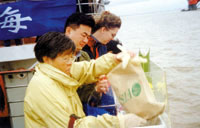 The photo shows that a foreign woman attended her father-in-law's sea burial with her husband and her mother-in-law.
The photo shows that a foreign woman attended her father-in-law's sea burial with her husband and her mother-in-law.
Other ways to conserve burial land include the use of grass burials and wall burials. Grass burials to some extent are similar to tree burials, while wall burials utilize a high wall with regular holes for ash boxes.
Last Friday, as a morning drizzle was bringing the cold weather back to Shanghai, Ding Yi, a retired teacher from Shanghai Institute of Physical Education, got up early to participate in a tree burial for her deceased elder brother.
"I got the news from the newspaper this February, and I registered for the ceremony," she said, holding the ash-box covered with a red cloth to her chest.
Ding Yi, a retired teacher from Shanghai Institute of Physical Education, put her elder brother's ashes into a hole beside a pine tree last Friday. The 69-year-old woman fetched the ashes from Nanjing, capital of east China's Jiangsu Province two days before the burial.
After her brother passed away in 1992 in Nanjing, capital of East China's Jiangsu Province, his ashes were placed in a funeral parlor there.
She went to fetch the ashes two days before the special funeral in Haiwan Memorial Park in Fengxian District.
"My relatives are all for my decision of the tree burial, although many choose to buy a small piece of land for the ashes in accordance with China's tradition," she said.
Tree Burial
To move forward with reforms on funeral practices, the city has introduced new burial methods over the last decade, which include tree burials, sea burials and grass burials.
Currently, around 100,000 people die every year, with the size of a tomb for ashes being 1.5 square meters on average.
"If everyone observed the old way, we would need a space of 150,000 square meters for the dead," said Gu Yuesheng, from Funeral and Interment Department of Shanghai Bureau of Civil Administration. "It is a serious problem for the city's growth."
The first tree burial in the city was carried out in the park early in 1993. Relatives and family members can choose to buy a kind of pine, and scatter the ashes around the pine when planting the tree.
However, almost eight years have passed, and only 500 people have chosen this type of burial.
"The key to this problem is people's conception," Gu said. "To return to the earth is rooted in people's minds."
To the Sea
Other ways to conserve burial land include the use of grass burials and wall burials. Grass burials to some extent are similar to tree burials, while wall burials utilize a high wall with regular holes for ash boxes.
Last year, some 1,021 ash boxes were scattered into the sea, which accounted for one tenth of the dead in the city.
"However, our business has kept on expanding," said Li Jun, director of the company.
"Only two sea burials were held in 1991, but last year some 702 families participated in six sea burials."
This year, all seats for the two scheduled sea-burials being held before the Pure Brightness have been booked, and people can only register for the 50th activity on April 20.
Li admitted that the company is losing money on the operation, and still relies on subsidies from the government.
"Asking people to cast away traditions that have been observed since ancient times is not easy," he said.
But, to his joy, people from other provinces even foreign countries attended the sea burial.
"Among these families, many of the deceased were Shanghai natives but worked outside of the city," Li said. "The families choose sea burial to bring the dead back to their hometown."
Follow the Leaders
Some leaders, including Zhou Enlai and Deng Xiaoping have also been buried at sea.
The company has found that the two leaders indeed have become models to many people. When millions of people got to know that Deng's ashes was scattered into the sea on TV in 1997, the enthusiasm for sea-burials among ordinary people soared. Participating families brought 839 boxes of ashes that year, compared to the previous year's 376 boxes for burial at sea.
To provide further service, the company is trying to arrange commemorations for families who choose sea burials.
(Shanghai Star March 28, 2002)
